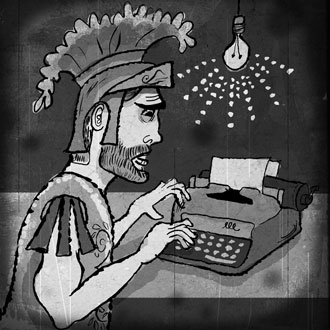 Homer in the Newsroom
Homer in the Newsroom
What can a journalist learn from the classics? Plenty.
As a reporter with a classics degree, I've often found myself looking to the Homeric hero Odysseus, the "man of twists and turns," who was forever sailing into strange new lands and predicaments with little more to draw on than his own resourcefulness.
Reporters have a lot more in common with Odysseus than you'd imagine. We're always poking our noses into places people don't want us to. We're always getting sidetracked. We're always trying unsuccessfully to get home in time for dinner. Like Odysseus, I sometimes find myself stuck in a Cyclops' cave of a story where, to judge by my educational background, I don't really belong.
Over the years I've grown accustomed to the double takes by colleagues and by the subjects of my stories when they learn that I majored in classics. "Is that so?" they say, giving me the sort of look reserved for airline pilots who've just admitted to a fear of heights.
My own professional odyssey has had its share of twists and turns. Before sailing into journalism, I studied Irish and Welsh, worked on an Indian reservation, and got a master's degree in comparative literature. As a reporter, I've written for an alternative weekly, a small daily, a major metropolitan daily, and now the Associated Press. I've covered everything from the AIDS epidemic, to the auto industry, to the death penalty, to higher education, to city hall. Along the way, there have been countless stories about murders, fires, explosions, car crashes, and robberies.
So how have I been able to draw on those years in Ascension Hall studying triremes and city-states and dactylic hexameter? What do the classics have to do with reporting?
To begin with, the classics give you gumption. That's because once you have publicly admitted to majoring in Greek and Latin, anything is possible. I've had to interrupt corporate executives, mid-interview, to ask questions that revealed my ignorance about basic business terminology. I've had to learn the intricacies of union organizing and big-time college athletics, all on deadline.
Once I was doing a phone interview with a man whose daughter had mysteriously disappeared a year earlier and was presumed dead. Halfway through our conversation he was overcome with emotion and had to hang up. What would Odysseus do? Call him back. It was one of the hardest calls I'd ever placed, but well worth it. He apologized. I apologized. We parted not as adversaries but, at least for the moment, partners in the grief of his tale.
The classics give you context. I don't care what your job is. The poetry, drama, history, philosophy, and science of the classics are invaluable guides to understanding our cultural and corporate selves. Literacy, in the largest sense, begins with the classics.
The biggest problem in journalism today, I believe--and in just about every field--is the lack of knowledge about what came before us. Even worse is the failure to understand that this might be a problem. Shouldn't doctors know who Edward Jenner was? Shouldn't trial lawyers know that the real "trial of the century" involved a famous aviator's dead child? What kind of banker doesn't know the precious metals' standard that William Jennings Bryan advocated?
Finally, the classics give you a grasp of human stories in their universality. The ancients lacked cable TV, blogs, and Facebook, but people still love, hate, wound, and kill each other for almost all the same reasons as they did 2,500 years ago. One of the most devastating murder cases I ever covered involved the shooting deaths of an Indiana University graduate student and the male friend who died trying to save her. The killer was a distraught former boyfriend who drove across country to surprise her in her dormitory. Afterwards, he killed himself. The evil of that shooting, and the bravery of that young woman's friend, stay with me today.
These events seem no less dramatic, no less filled with pathos, than the struggles that Homer's epic poems described and made immortal. Does comparing those Indiana deaths to ancient poetry trivialize them? I believe the opposite. It forces me to hold my narration of such stories and the memory of what happened to the highest possible standards, those set by the universal values contained within the classics.
Homer described Odysseus as cunning and wily, but also wise-hearted, bold, glorious, and godlike. Not a bad role model, after all, for any reporter.
Andrew Welsh-Huggins is a reporter with the Associated Press in Columbus, Ohio. This essay is adapted from a talk he gave in 1999 at a Kenyon symposium honoring Professor of Classics William McCulloh upon his retirement.
Do you have feedback on this page?
